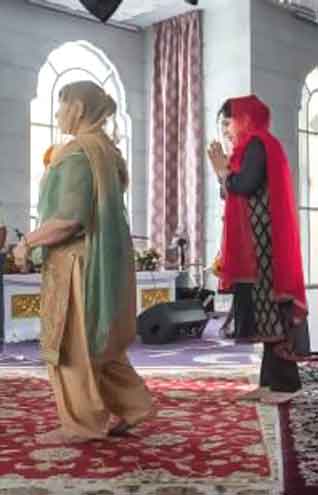Travel
Freedom to Pray:
Dubai, United Arab Emirates
RAMOLA TALWAR BADAM
Dubai, United Arab Emirates (UAE)
A sandstone-coloured gurdwara in Jebel Ali has become the latest symbol of religious tolerance in the UAE.
People file in under small domes and arches trimmed with lattice work. They remove their shoes and cover their heads as the singing of kirtan and hymns fill the region's only gurdwara.
Apart from being a place of worship for Sikhs, it is also a must-see for many tourists.
"When visitors land they immediately want to come to the gurdwara," said Baljinder Kaur, an IT consultant and mother of two who takes visiting friends and family from the UK, Bahrain and Qatar to the gurdwara.
"They want to start their journey by bowing their heads here. Even taxi drivers bring people. They ask, 'Have you seen this place?' It has become a monument of sorts."
Seth Alves, a tourist from Kenya, was among several hundred people entering the gurdwara this week to sit cross-legged in a hall filled with worshippers listening to devotional songs.
"I was in the textile souq on a tour when I heard about this place," he said. "I was amazed that there is one in the UAE, so I had to come and see for myself.
"I always found a sense of peace when at a gurdwara with my Sikh friends in Kenya and I know all religions are welcome."
Ajit Singh, who sings kirtan at community functions, fields many queries from tourists.
"They spot my turban and ask me questions," Ajit said. "They ask me for the best time to visit and how big it is."
Before the gurdwara opened last year, the 50,000-strong Sikh community prayed at borrowed and shared premises in Bur Dubai.
Observing different last rites for the dead is equally important to the country’s diverse residents. Which is why Sharjah opened a crematorium in February - the country's fourth.
"Some families have lived here for 50 years. This is home to them, so it's very important for them to be cremated here," said Prabhdeep Singh, a chartered accountant.
"All their relatives are in the Emirates and so they want their last rites performed here rather than taking the body back to Punjab.
"Practicing your religion to the end makes a big difference to people's lives and gives them a sense of peace."
"It's a small country but we are still given the freedom because the rulers know and understand that we can be free to pray and not upset others," said Jitendar Singh who runs a local charity group, Welfare of Mankind.
"To be allowed to pray and follow your own religion shows understanding and openness."
Parents said the spirit of service taught in religious institutions helped to shape their children. In the Sikh gurdwara, up to 600 people are fed community meals in a langar - community kitchen - hall where people sit cross-legged.
Rich and poor followers sit together after religious services to share a meal.
"My children understand the power of contribution, they donate 10 per cent of their pocket money every month," said Baljinder Kaur, 35, who takes her children, aged 7 and 9, to the gurdwara for Friday prayers.
"When serving meals there, they realise that time given in service is precious. Everyone feels more settled and secure."
[Courtesy: The National. Edited for sikhchic.com]
July 3, 2013
Conversation about this article
1: Harminder Singh (Jalandhar, Punjab), July 04, 2013, 12:27 AM.
We thank the Government Of UAE for allowing to build the gurdwara there. While in a gurdwara we feel at home, no matter where it is. This will definitely spread the message of service, humility and equality of our Gurus.
2: Sangat Singh (Kuala Lumpur, Malaysia ), July 04, 2013, 9:39 AM.
This is the first, finest building for a gurdwara in UAE. Quite rightly, no expense was spared to secure a foot in the door as a result of relaxed religious tolerance by the Government of UAE. Does a building alone make a gurdwara? "An abode of the Guru." Not too far away from Dubai in today's Afghanistan where exist a number of historical gurdwaras hallowed by the foot-prints of Guru Nanak on his return from Baghdad. There's also one in Ghazni where Bhai Nand Lal once lived. With the dwindling population of Sikhs in the country, they are in a highly deplorable state. The few families left, mainly women and children, have no where to go. The women are not allowed to work. There are no schools for children. To get a picture of their dire circumstances who are living mainly on charity, please click on the following site. It speaks for itself ... see if you can sleep soundly tonight: http://www.youtube.com/watch?v=0h11jAyO0zg The saying, "gareeb da mooh, Guru di golak" - Feeding the poor and needy is like putting a coin in the Guru's hands! Seeing this video, perhaps it will nudge United Sikhs or other organizations to scramble together and help these few remaining poor, destitute families in Afghanistan. Perhaps help them to relocate in India or elsewhere and allow them the dignity they deserve. A five or ten course langar in Dubai will not earn you the same merit points in the Guru's Darbar. Please see the video and see how these destitute families could be helped.




